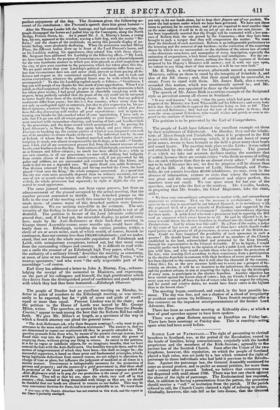The people of Dundee had an excellent meeting on Monday,
in- ferior in point of numbers to the Edinburgh meeting, as was neces- sarily to be expected, but for " pith of sense and pride of worth" equal or more than equal. Provost Lindsay was in the chair ; and the petition to the House of Lords was moved by Mr. George Milne, writer. The speeches, as quoted by the Times from the Dundee Courier,* appear to rank among the best that the Reform Bill has called forth. We give Mr. Milne's at length, as a specimen of the way in which a Scotch attorney can plead the general issue-
" The Anti-Reformers ask, why these frequent meetings?—why meet to give utterance to the same stale and threadbare sentiments? The answer is, that we are determined to repeat our sentiments till they be properly attended to. The question proceeds from those who, by means of the present corrupt system, have found their way into the People's pockets, and wish to retain the power of emptying them, without giving any thing in return. As stated in the petition, it is for no vague or indefinite objects, for no imaginary benefits, that we have entered the lists with the Anti-Reformers. Our hostility towards them, and to the system of misgovernment of which they have been—but shall no longer be—the successful supporters, is based on those great and fundamental principles, which, being legitimate deductions from natural reason, are not subject to alteration by change of time or place, but influence the judgment of mankind at all times in a similar manner. Government is indispensably necessary for the protection of persons and property,; and the essence of a good government is, that these shall be protected at the least possible expense. The enormous expense which the Anti-Reformers wish us to pay for our protection is the cause of our quarrel with them. They tell us that we are, upon the whole, very well off in this country—that, instead of being dissatisfied with things as they are, we should be thankful that our heads are allowed to remain on our bodies. This may be very convenient doctrine for them, but it isnot so palatable to us. We want them • Oar copy of the Dundee Advertiser has not reached us this week, and the report in the Times Jur:plait, abridged. not only to let our beads alone, but to keep their fingers out of our pockets. We know the bad system under which we have been governed. We have met three times to petition for its correction • and if we are required to meet another time on the same subject, it will be to do an act of our own in our own favour. It has been impudently asserted that the People will be contented with a less mea- sure of Reform than the one passed by the Commons,—that they have beim brought to such a temper that they will compromise the matter. We must show the falsehood of such assertions. Reform is an indispensablepreliminarytce the lessening and the removal of our burdens—to the correction of the numerous abuses by which we are surrounded—to the abolition of the odious law of entail —the obnoxious corn-laws, and monopolies of every description, especially the extinction of corporations, which fetter industry and intelligence. lor the car- section of these and similar abuses, nothing less than the measure of Reform proposed by his Majesty's Ministers will answer ; and if, with our eyes open, we submit to any thing short of that measure, it will be our own fault."
Mr. E. Buik, a working weaver, afterwards moved a memorial to Ministers, calling on them to stand by the integrity of Schedule A, awl also of the 101. clause ; and, that their stand might be successful, to create Peers to stand with them. Mr. James Buik, also a weaver, seconded this motion, which was unanimously agreed to ; and Mr. Christie, banker, was appointed to draw up the memorial.
The speech of Mr. James Buik is a curious example of the Scriptural
style so prevalent among all classes in Scotland— • "It was well known," lie said, " that the party which had gone over to the support of the Ministry was Lord Wharucliffe and his followers; and every body knew that these individuals opposed the franchise being so low as 101. They were not real Reformers ; they had not the root of the matter in them ; they were the stout'-ground Reformers, who would wither and perish as soon as ex- posed to the sunshine of democracy."
The petition is to be presented by the Earl of Camperdown.



























 Previous page
Previous page